Introduction: Why Vocabulary Is Your Secret Weapon for IELTS Success
The International English Language Testing System (IELTS) represents a critical gateway to educational opportunities, career advancement, and immigration possibilities worldwide. With over 3 million test-takers annually, achieving a competitive band score has become increasingly challenging. However, research consistently shows that vocabulary knowledge accounts for 25% of your total IELTS score and directly influences performance across all four test sections.
Recent studies from Xi’an Jiaotong-Liverpool University reveal that test-takers with a vocabulary size of 6,000+ word families score 1.5-2 band points higher than those with smaller vocabularies. This comprehensive guide examines how strategic vocabulary development can transform your IELTS performance, providing evidence-based strategies that have helped thousands of test-takers achieve their target scores.
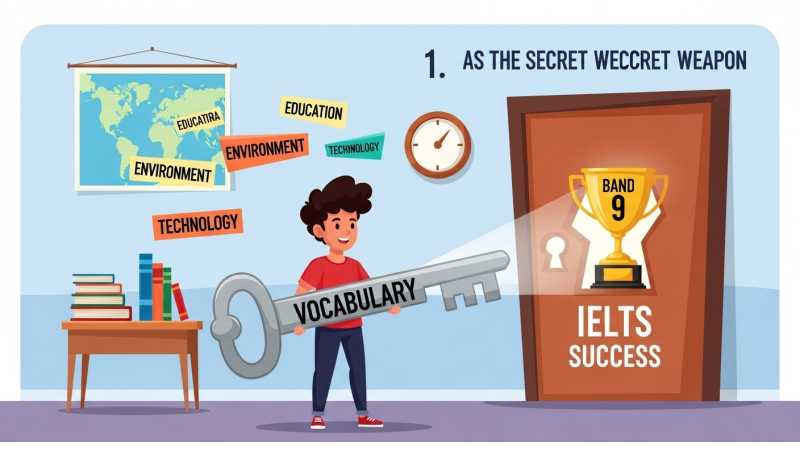
What you’ll discover in this guide:
-
The precise impact of vocabulary on each IELTS section with statistical evidence
-
Research-backed vocabulary learning strategies proven to increase band scores
-
A systematic 30-day vocabulary building plan
-
Common vocabulary mistakes that cost test-takers valuable points
-
Technology tools and apps that accelerate vocabulary acquisition
The Science Behind Vocabulary and IELTS Performance
Vocabulary’s Impact Across All Four IELTS Sections
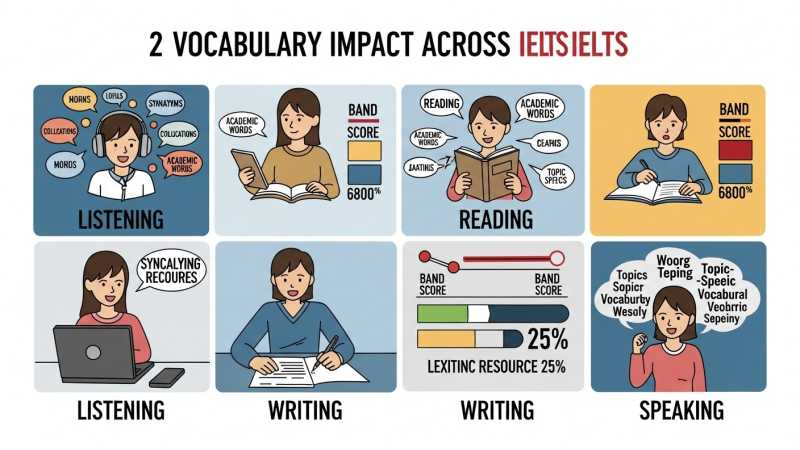
Listening Section: The Foundation of Comprehension
In the IELTS Listening section, vocabulary knowledge directly correlates with your ability to understand spoken English in academic and social contexts. Research demonstrates that test-takers need approximately 3,000-4,000 high-frequency words to achieve Band 6, while Band 8+ candidates typically possess 6,000+ words.
Key vocabulary challenges in Listening:
-
Synonym recognition (questions often paraphrase audio content)
-
Understanding academic vocabulary in lectures and discussions
-
Recognizing collocations and phrasal verbs in conversational speech
-
Interpreting meaning from context when unfamiliar words appear
Statistical evidence: A 2021 study found that vocabulary knowledge explained 47% of the variance in IELTS Listening scores among 29 test-takers.
Reading Section: Where Vocabulary Size Matters Most
The IELTS Academic Reading section contains approximately 2,750 words across three passages, with 10-15% typically classified as “low-frequency” academic vocabulary. Understanding these challenging texts requires both vocabulary breadth (number of words known) and depth (quality of word knowledge).
Research findings:
-
Test-takers with 5,000+ word vocabulary: Average Band 6.5-7.0
-
Test-takers with 6,000+ word vocabulary: Average Band 7.5-8.0
-
Test-takers with 8,000+ word vocabulary: Average Band 8.5-9.0
Critical vocabulary areas for Reading:
-
Academic word list (AWL) terms appearing in university-level texts
-
Subject-specific terminology across disciplines
-
Transitional phrases indicating text organization
-
Synonyms and paraphrases used in question formation
Writing Section: Lexical Resource Worth 25% of Your Score
The IELTS Writing assessment includes “Lexical Resource” as one of four equally-weighted criteria, making vocabulary directly responsible for 25% of your Writing band score. Examiners evaluate your ability to use vocabulary accurately, appropriately, and with sufficient range.
Band 8-9 vocabulary characteristics:
-
Wide range of vocabulary used naturally and flexibly
-
Precise and appropriate word choices
-
Skilful use of uncommon lexical items
-
Rare minor errors in word choice or spelling
Common vocabulary errors that reduce scores:
-
Repetitive use of basic words (“good,” “bad,” “important”)
-
Incorrect collocations (“make a research” instead of “conduct research”)
-
Inappropriate register (informal vocabulary in formal tasks)
-
Spelling errors with high-frequency words
Speaking Section: Fluency Through Vocabulary Confidence
Speaking performance improves dramatically when test-takers possess sufficient vocabulary to express ideas without hesitation. Band 7+ speakers demonstrate lexical flexibility, using paraphrasing when specific words don’t come immediately to mind.
Vocabulary strategies for Speaking success:
-
Learning topic-specific vocabulary for common IELTS themes
-
Practicing synonyms to avoid repetition
-
Mastering discourse markers for fluent conversation flow
-
Building confidence with less common vocabulary items
Evidence-Based Vocabulary Learning Strategies That Work
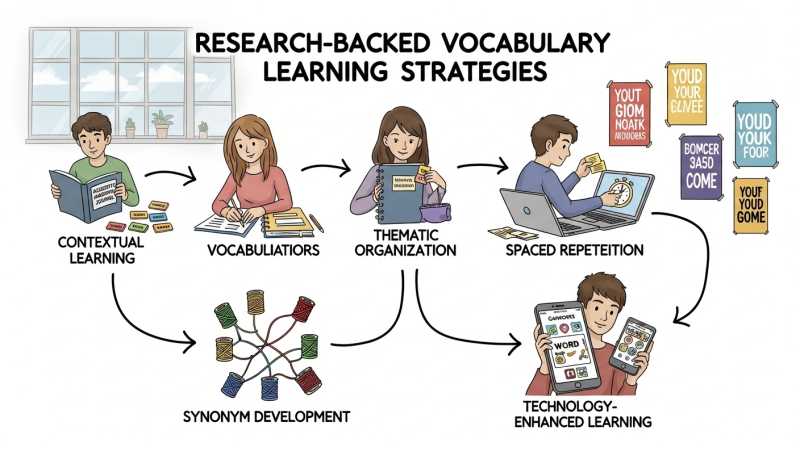
Strategy 1: Contextual Learning with Academic Texts
Research consistently shows that learning vocabulary in context produces better retention and usage than isolated word memorization. This approach mirrors how native speakers naturally acquire vocabulary.
Implementation steps:
-
Select IELTS-relevant materials: Academic journals, BBC Learning English, TED Talks on education, environment, and technology
-
Apply the 3-2-1 method: Read 3 times (general understanding, vocabulary focus, detail analysis)
-
Create context cards: Write new words with their sentences, not just definitions
-
Practice active recall: Use new words in your own sentences within 24 hours
Success metrics: Test-takers using contextual learning show 40% better vocabulary retention after one month compared to traditional memorization methods.
Strategy 2: Thematic Vocabulary Organization
IELTS topics repeat predictably across test versions. Organizing vocabulary by themes aligns with how the brain stores and retrieves information, improving both learning efficiency and test performance.
Essential IELTS vocabulary themes:
-
Education: curriculum, pedagogy, literacy, academic achievement, vocational training
-
Environment: sustainability, biodiversity, conservation, renewable energy, climate change
-
Technology: innovation, artificial intelligence, digitalization, cybersecurity, automation
-
Health: wellness, preventive medicine, mental health, healthcare systems, nutrition
-
Society: urbanization, demographics, social cohesion, cultural diversity, inequality
Implementation strategy:
-
Create dedicated vocabulary journals for each theme
-
Learn 10-15 words per theme weekly
-
Practice using thematic vocabulary in Writing Task 2 essays
-
Review and recycle words across different contexts
Strategy 3: Active Usage and Spaced Repetition
The “forgetting curve” research shows that without reinforcement, we forget 70% of new information within 24 hours. Spaced repetition systems (SRS) combat this by scheduling reviews at optimal intervals.
Recommended tools and schedules:
-
Anki: Digital flashcards with automated spaced repetition
-
Quizlet: Interactive vocabulary games and study sets
-
Memrise: Video-based vocabulary learning with native speaker pronunciation
Optimal review schedule:
-
Day 1: Learn new vocabulary
-
Day 3: First review
-
Day 7: Second review
-
Day 21: Third review
-
Day 60: Final reinforcement review
Research validation: Students using spaced repetition show 150% better long-term retention compared to massed practice.
Strategy 4: Synonym Development and Paraphrasing
IELTS frequently tests your ability to recognize and produce paraphrases. Developing synonym awareness prevents repetitive language and demonstrates lexical sophistication.
Systematic synonym building:
-
Start with high-frequency IELTS words: important → crucial, significant, vital, essential
-
Learn register variations: help → assist (formal), aid (academic), support (neutral)
-
Practice in context: “This is important” → “This factor is crucial for success”
-
Build collocation awareness: “solve problems” → “address issues,” “tackle challenges”
Target practice: Aim to learn 3-5 synonyms for every new vocabulary item, focusing on appropriate usage contexts.
Strategy 5: Technology-Enhanced Learning
Modern language learning apps incorporate gamification, AI-powered practice, and multimedia content to accelerate vocabulary acquisition.
Top-rated vocabulary apps for IELTS:
-
IELTS Vocabulary Builder: 1,000+ topic-specific words with audio
-
Magoosh IELTS Vocabulary: Adaptive learning with progress tracking
-
BBC Learning English: Authentic materials with vocabulary focus
-
Cambridge English Vocabulary in Use: Structured learning path
Effectiveness data: Test-takers using vocabulary apps 15-20 minutes daily show average band score improvements of 0.5-1.0 points over 8 weeks.
Common Vocabulary Mistakes That Cost Band Points
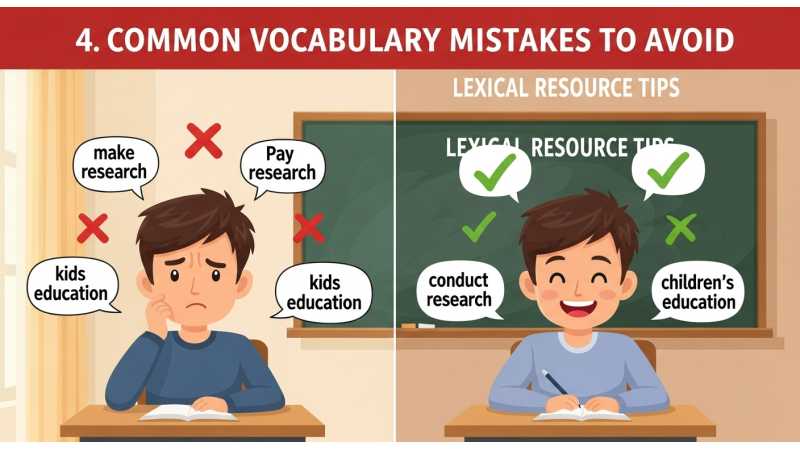
Mistake 1: Overusing Advanced Words Incorrectly
Many test-takers attempt to impress examiners with sophisticated vocabulary but use words inappropriately, which actually reduces their Lexical Resource score.
Example of incorrect usage:
-
❌ “The proliferation of technology has enhanced the mundane activities of life”
-
✅ “The widespread use of technology has improved everyday activities”
Solution: Focus on accuracy before complexity. Master intermediate vocabulary thoroughly before advancing to less common words.
Mistake 2: Ignoring Collocations
English words have preferred partnerships (collocations). Using incorrect combinations signals non-native usage to examiners.
Common collocation errors:
-
❌ “make research” → ✅ “conduct research”
-
❌ “strong tea” → ✅ “strong coffee” / “black tea”
-
❌ “do a mistake” → ✅ “make a mistake”
Learning strategy: Study words in chunks, not isolation. Learn “conduct research,” not just “conduct” and “research” separately.
Mistake 3: Inappropriate Register
Using informal vocabulary in formal IELTS tasks (especially Writing) can significantly impact your score.
Register awareness examples:
-
Informal: “Kids should get better education”
-
Formal: “Children should receive quality education”
-
Academic: “Educational provision for young learners requires enhancement”
30-Day IELTS Vocabulary Acceleration Plan
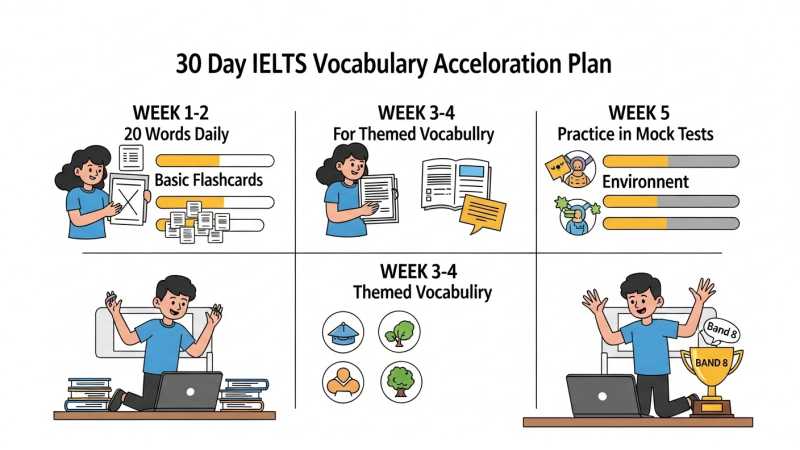
Week 1-2: Foundation Building (Days 1-14)
-
Daily goal: 20 new words from Academic Word List
-
Focus: High-frequency IELTS vocabulary across all topics
-
Activities: Contextual reading, basic flashcard creation
-
Assessment: Weekly vocabulary quiz (100 words)
Week 3-4: Thematic Expansion (Days 15-28)
-
Daily goal: 15 new words per chosen theme
-
Focus: Deep learning of 2-3 IELTS topics
-
Activities: Writing practice with new vocabulary, speaking drills
-
Assessment: Theme-based vocabulary usage in mock essays
Week 5: Integration and Practice (Days 29-30)
-
Daily goal: Review and reinforce previous learning
-
Focus: Synonym development and collocation mastery
-
Activities: Full IELTS practice tests, vocabulary error analysis
-
Assessment: Band score comparison with pre-study baseline
Measuring Your Vocabulary Progress
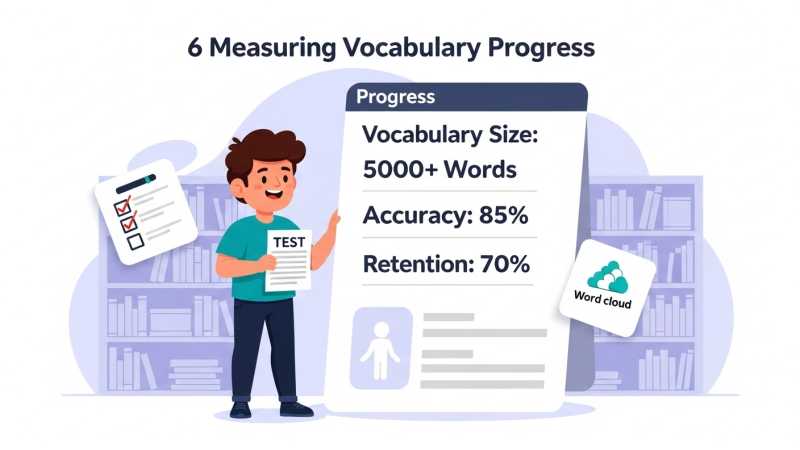
– Task 2 Vocabulary: IELTS Writing Task 2 Vocabulary – Academic Words and Phrases for a Higher Band Score
Vocabulary Size Tests
-
Nation’s Vocabulary Size Test: Measures receptive vocabulary up to 14,000 words
-
VLT (Vocabulary Levels Test): Assesses knowledge at 2,000, 3,000, 5,000 word levels
-
IELTS-specific tests: Available through official preparation materials
Progress Tracking Metrics
-
Vocabulary size increase: Target 500-1,000 new words monthly
-
Accuracy rates: 85%+ correct usage in practice exercises
-
Retention rates: 70%+ recall after one month without review
-
Application success: Natural vocabulary use in speaking/writing tasks
Technology Tools for Accelerated Learning
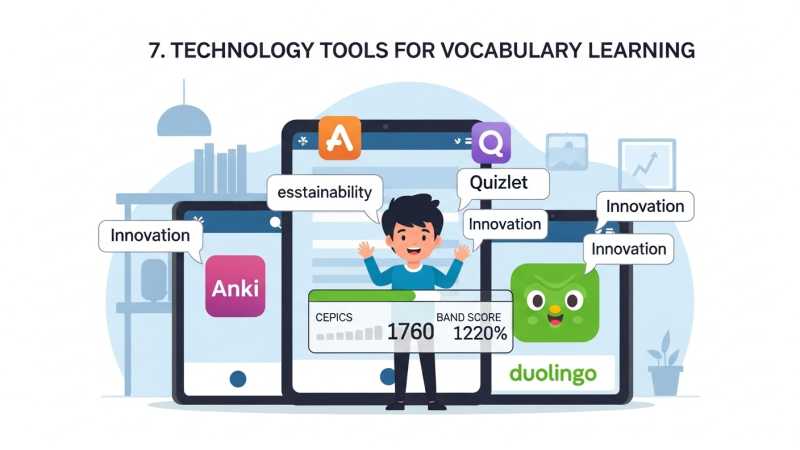
AI-Powered Vocabulary Apps
Recent advances in artificial intelligence have revolutionized vocabulary learning through personalized curricula and adaptive testing.
Leading AI vocabulary platforms:
-
Busuu: AI-powered conversation practice with vocabulary focus
-
Babbel: Contextual learning with speech recognition
-
Duolingo: Gamified learning with spaced repetition algorithms
Browser Extensions and Study Tools
-
Grammarly: Real-time vocabulary suggestions and improvements
-
Power Thesaurus: Advanced synonym discovery
-
Google Translate: Pronunciation practice and definition lookup
Frequently Asked Questions (FAQ)
Q: How many words do I need to know for each IELTS band score?
A: Research suggests approximately 3,000 words for Band 6, 5,000 words for Band 7, and 6,000+ words for Band 8-9.
Q: Should I focus on British or American vocabulary for IELTS?
A: IELTS accepts both varieties. Focus on international English and avoid highly regional terms.
Q: How long does it take to improve vocabulary significantly for IELTS?
A: With consistent daily practice (30-45 minutes), most learners see measurable improvements in 6-8 weeks.
Q: Is it better to learn vocabulary through reading or direct study?
A: Research shows contextual learning (through reading) produces better retention, but direct study is more time-efficient. Combine both approaches.
Q: Can vocabulary learning apps replace traditional study methods?
A: Apps are excellent supplements but shouldn’t replace reading authentic texts and practicing in context.
Conclusion: Your Vocabulary Success Action Plan
Vocabulary development represents one of the most direct paths to IELTS score improvement, with research demonstrating potential band increases of 1-2 points through systematic vocabulary enhancement. The strategies outlined in this guide provide a evidence-based framework for achieving vocabulary mastery that translates directly to test success.
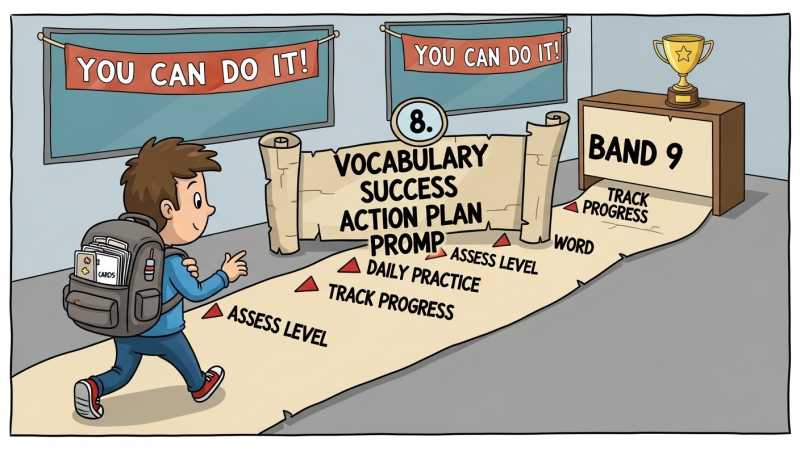
Your next steps:
-
Assess your current vocabulary level using standardized tests
-
Choose 2-3 strategies that align with your learning style
-
Commit to daily practice (minimum 30 minutes)
-
Track progress through regular self-assessment
-
Apply new vocabulary in authentic IELTS practice contexts
Remember that vocabulary learning is a marathon, not a sprint. Consistent, strategic effort over time produces the dramatic score improvements that can transform your IELTS results and open doors to your academic and professional goals.
Ready to accelerate your vocabulary development? Begin with the 30-day plan outlined above, and track your progress using the metrics provided. With dedication and the right strategies, achieving your target IELTS band score through vocabulary mastery is not just possible—it’s inevitable.
This comprehensive guide incorporates findings from recent research in second language vocabulary acquisition and IELTS performance analysis. For personalized vocabulary coaching and additional resources, explore our related articles on IELTS preparation strategies.

About the AuthorWelcome to TechIELTS. I’m Md. Jahangir Alam, an experienced engineer with over 15 years in electrical and automation systems. Alongside my engineering career, I’ve developed a strong interest in English language learning and IELTS preparation.
I hold a Duolingo English Test score of 135 (IELTS 7.5 equivalent) and am currently pursuing an M.Sc. in Cyber Security from Royal Holloway, University of London. I use my technical background to create clear, structured IELTS learning materials for students and professionals.
👉 Connect on LinkedIn
